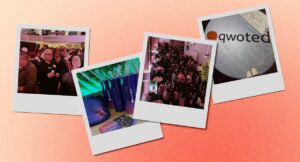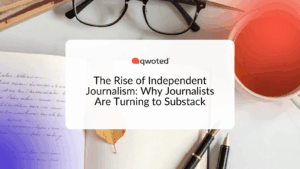When I hear the phrase “Media Advisory Board,” I have much the same reaction as when my former bosses called meetings. That is: I want to pull my hair out. No wonder I have such a big honking bald spot today.
If you too believe “Media Advisory Board” ranks right up there with “Social Media Consultant” (laid-off journalist) or “Director of Innovation” (the guy who orders the break room ping-pong tables), I wouldn’t blame you.
So how can I assure you that Qwoted means business in creating its first such board?
Ultimately, the proof will lie in what this board accomplishes–and what you can help it accomplish. Because what concerns me, almost every single day in this line of work, is this: The Death of Institutional Memory and Best Practice.
Back when the pissed-off T. Rex stomped through newsrooms like a ferocious editor; before faxes and Internet; before YouTube and Facebook, journalism staked its very lifeblood on priceless practices handed down over generations. Let us not romanticize too much. Sure enough, journalism once was a profession inexorably linked to sexism, racism and alcoholism. But when I first set foot in a major metro newsroom, I learned from greats who in turn learned from greats with ties to modern journalism pioneers.
One of my first Chicago Tribune editors, the lovable night desk king Milt Hansen, was old enough to have worked as a cub with reporters who covered Prohibition, Al Capone and World War II. They in turn knew the Indomitable Robert McCormick, the Tribune’s owner and chief executive braggart, a 6-ft.-4 mess of contradictions. He actually invented the car safety belt, but also fought a piddly World War I battle as a form of rich-boy slumming and forever after insisted people address him as Col. McCormick. That noted, he also financed, fought and won a landmark court case that preserved press freedom in the early 20th Century.
In my 1980s newbie days, without Amazon or YouTube to distract me, I sat in on brown-bag lunches at a humble suburban bureau of the Philadelphia Inquirer. The chow-downs were food for the hungry young mind, led by photogs who’d encircled the globe and reporters who’d won Pulitzers before turning 30. Mentoring relationships flourished. I was tutored in the fine points of police reporting by a newsroom legend named Bo Terry, who talked like a gangster and never finished high school. He couldn’t even write above 7th grade level. But Bo landed scoop after scoop after scoop because he played poker with Philly cops in the precinct basement. The games involved gambling and were of course were illegal. My chief mentor, David Lee Preston, wrote about a cat serial killer with just the right touch of puckishness. HIs lede was a roll call of the cute and the dead: Monkey, Sid, Ornery.
His mother also survived the Nazis by living in a sewer in Poland for year.
That old school media world moved slower. There was no 24-hour news cycle. And J was far less obsessed with ROI (which stands for return on investment and revenue-obsessed idiots). Experienced reporters were regarded as a treasure: brought out instead of bought out. While the Chicago Tribune bean counters traded high fives at the cigar bar after buying out two highly-paid features editors in 2007, my deskmate and I watched with sadness. In one day, a combined six decades of institutional memory walked out the door.
What happens when exemplary street smarts, ethical standards and the wizardly secrets of reporting and writing are not passed on? You know: wet-behind-the-airpods journalists, thrust into “dream jobs” because they’re grateful to take nightmarishly low pay. Editors who haven’t met their writers, don’t care and communicate by email exclusively. Video news releases fed to TV stations by political operatives, and broadcast as “real” stories. “Truthiness.” News outlets run by political agenda and that repeat and repeat and repeat and repeat lies until they stand in as truth.
And in general, confusion between sustenance and junk food, leaving reporters to believe that a legit scoop is that BuzzFeed photo gallery detailing Ariana Grande’s top 10 bra fails. No wonder when BuzzFeed reporters Jason Leopold and Anthony Cormier tried to break a legit story on hi-jinx involving former Trump fixer Michael Cohen, the reporters were laughed out of the spotlight by colleagues. Though a onetime Pulitzer finalist, Leopold also has a past checkered by accusations of plagiarism and inaccuracy.
Now in general, if a reporter skirts the ethics of his profession–especially by lying–how can he ever be trusted not to do it again? Meanwhile, the core contingent of BF’s BFFs bellowed, “Give us back our buxom broads and their wardrobe malfunctions!” Of course, the story that Donald Trump told Cohen to lie to Congress was never substantiated. So there you go: almost as much substance as a swimming pool full of whipped cream.
Qwoted may only be able to do a small part to plant a flag for journalism excellence; as for me, perhaps even less. However, the art and craft of it lives in my bones. Someday dem old bones will be food for worms and before then, there is much work to do. We need to coax the storytelling genius out of new talents. We need to remind bloggers, the neophyte and the naive, just how ethics work. We need to start lively discussions on how journalism can earn the trust of the public at a time when “Fake News” sticks even to the Real Thing. We must mentor promising talent and build a bridge between those fine J schools that can teach the fine points and real-world magic as taught in the School of Hard Knocks. And even if we occasionally get it wrong, or cite facts that don’t pan out in time, we must report the truth as we see it, as best as we can tell it, not 90 or 95 or 98 but 100 percent of the time. If we contritely try to man/woman up after getting caught, it will be too late.
How will this Media Advisory Board work? Can’t say exactly. But if you’re the kind of person who is passionate about keeping the flame of reporting and writing burning–for its light, heat and intensity–then I invite you to contact me. Let’s get the discussion started and keep it simple: looking for first steps to further the Greater Good for Reporters, Bloggers, Columnists and Writers Everywhere.
Lou Carlozo is the Editor of Chief of Qwoted: lou@qwoted.com
This week on Lou Carlozo’s Bankadelic: Part two of a special podcast dedicated to women, leadership and financial services, featuring four female standouts who share their experiences and sharp insights.



